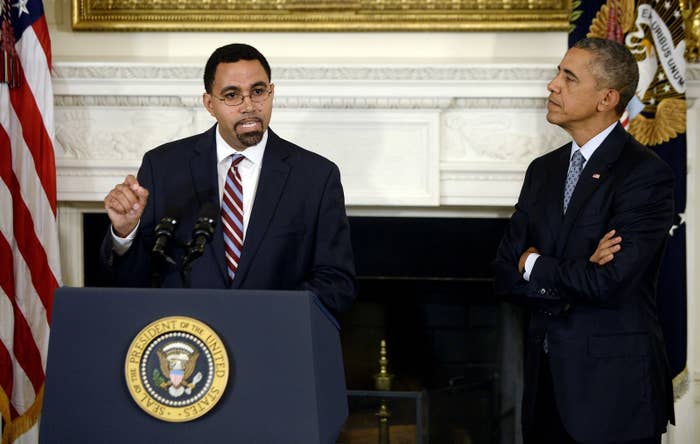
Colleges will be banned from using legal language that prevents their students from suing them, under a sweeping reform package announced today by the Obama administration.
The proposed regulations bar universities that accept federal student loan dollars — essentially all U.S. schools — from locking their students into forced abritration agreements. Such agreements have become widespread at for-profit colleges across the country, and have been broadly criticized for limiting the ability of students to take complaints before a judge and jury.
The Obama administration rules also codify the process for students seeking to have their student loans cancelled in cases where they were defrauded by their school — and would even grant automatic debt forgiveness in some cases.
Automatic forgiveness — which would be offered only at the secretary of education's discretion — would be a major victory for student activists, who have long said it is unfair to require individual students to submit applications in the face of incontrovertible proof that they have been defrauded.
"The Department of Education’s move to protect students from for-profit colleges’ use of mandatory arbitration clauses is a potential game-changer," said senator Dick Durbin, a Democrat, in a statement. "This rule will be President Obama and Secretary King’s higher education legacy."
The proposal was criticized by the for-profit college industry.
"The complex and burdensome nature of this regulation will crush career education," said Steve Gunderson, the president of the country's largest for-profit college lobbying group, now called Career Education Colleges and Universities. "We hope they will put aside this foolish and costly proposed regulation, but based on their poor track record we doubt they will listen to voices of reason."
The Obama administration has taken a hard tack against for-profit colleges, pushing through a rule that would cut off federal financial aid to schools whose students take on high debt loads but earn little with their degrees. John B. King, Obama's new Secretary of Education, said the proposed regulations were another step forward, this time with a focus on ferreting out wrongdoing and limiting damage to taxpayers caused by fraudulent schools whose loans must be forgiven.
The effective prohibition of mandatory-arbitration clauses has the potential to do more than simply restore legal rights to students, said Robert Shireman, a senior fellow at the Century Foundation and a former Obama administration official.
It could help governments more easily discover fraud, Shireman said, because it enables students to band together in open court against a college, rather than in closed, confidential arbitration sessions. In a courtroom, students and their lawyers will have the power of discovery, something that is essentially nonexistent in arbitration systems.
"It's critical in terms of preventing future fraud and abuse," Shireman said, because it allows "for law enforcement to learn about wrongdoing sooner, rather than later. A lot has gone on in arbitration that we don't know about."
Some activist groups praised the department's rule on arbitration agreements and its move to consider automatic forgiveness. But they criticized the department's proposal to calculate the "damage" inflicted by schools, giving only limited loan forgiveness to defrauded students who have in some way "benefited" from their degrees. The Institute for College Access and Success called distinction that "unclear and complex."
The Debt Collective, an activist group, criticized the lack of specificity on issues such as whether borrowers would be forced to shoulder tax bills when their loans were forgiven, saying, the administration's rules "amount to little more than a loose statement of intention to do right by student debtors."
The rules proposed today could could also pose a serious financial threat to the country's for-profit colleges, some warn. They seek to impose heavy financial penalties on colleges that are suspected of wrongdoing, or are otherwise at risk for closing — a measure that for-profit colleges say could "crush career education," according to the country's largest for-profit college lobbying group.
Colleges facing major lawsuits from agencies like the Consumer Financial Protection Bureau, or where large numbers of students have filed loan forgiveness claims, will be required to post a "letter of credit" — essentially an assurance that it will be able to pay outstanding obligations if it closes. That letter of credit must amount to 10% of a school's total federal funding — a hefty number in the cases of many for-profit colleges, who draw as much as 90% of their revenue from the federal government.
Smaller for-profits colleges are most at risk under the department's financial regulations, said Trace Urdan, an analyst at Credit Suisse who covers the sector: they will be far less able to deal with the costs of class-action lawsuits, and could struggle to find banks willing to give them the credit they need if the department demands it.
"It has the potential to squeeze everyone," Urdan said. "But it's a bigger deal for small-scale businesses." Banning arbitration clauses is tantamount to declaring "open season for plaintiff's attorneys. It's one thing to deal with those if you're a company like Apollo or Kaplan, but it's another thing if you're a family-owned business."
But some large for-profit colleges could be in danger, too. One test case for the administration's new rules is ITT Technical Institute, another of the country's biggest for-profit chains. Earlier this month, ITT's accreditor imposed a sanction that could, ultimately, threaten the school's stamp of approval. As a result, the department demanded ITT nearly double its letter of credit, demanding more than $125 million. That demand has put ITT at risk of default with its creditors, threatening another high-profile collapse.
When the for-profit Corinthian Colleges collapsed in 2015, it left thousands of defrauded students in its wake. As many as 20,000 of those students have since filed for their loans to be forgiven by the government. Corinthian, bankrupt, left the tab to taxpayers, which had climbed above $90 million in March.
